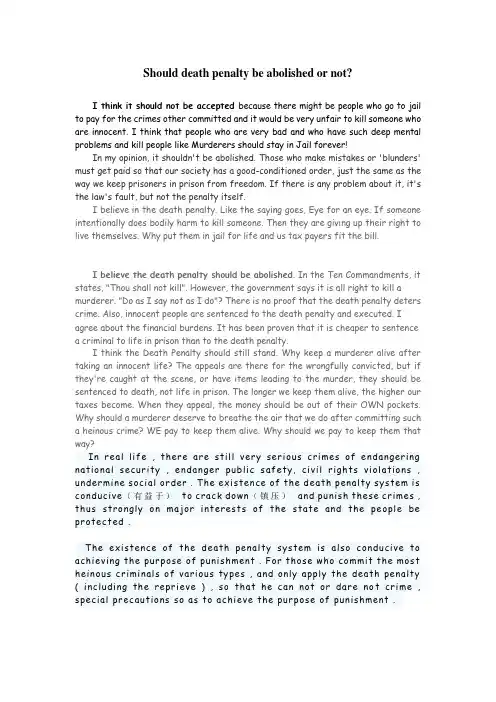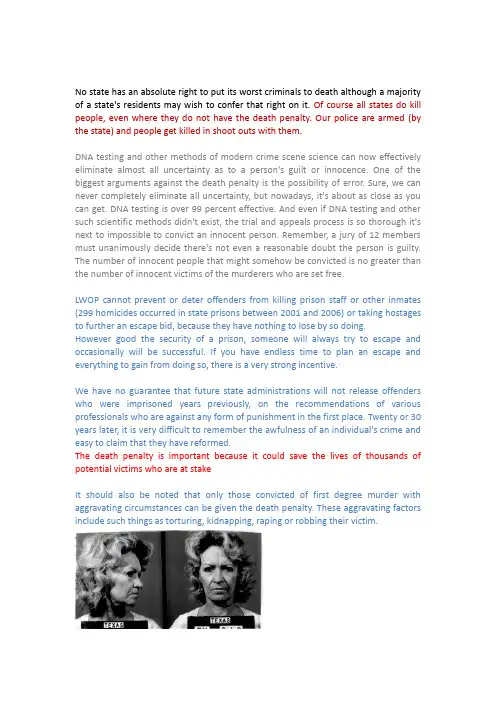死刑是否应该废除的辩论death penalty
- 格式:docx
- 大小:73.43 KB
- 文档页数:8

是否应该废除死刑辩论辩题正方,应该废除死刑。
首先,死刑是一种不可逆转的刑罚,一旦执行就无法挽回。
然而,司法系统并非完美,存在着错误判决的可能性。
据统计,全球范围内有大量的冤假错案,如果死刑被执行,就意味着无辜者将永远失去生命。
这违背了人权的基本原则,因此应该废除死刑。
其次,死刑并没有显著的犯罪预防效果。
许多研究表明,死刑并不能有效地减少犯罪率。
相反,一些国家废除死刑后,犯罪率并未显著上升。
因此,死刑并非解决犯罪问题的有效手段,废除死刑可以更好地保护人们的生命权。
此外,废除死刑也符合人道主义精神。
伟大的人权倡导者尼尔森·曼德拉曾说过,“一个国家的文明程度可以从其对待囚犯的方式中看出来。
”废除死刑可以体现一个国家对人权和尊严的尊重,有利于提升国家的国际形象和道德水平。
最后,废除死刑也可以为罪犯提供改过自新的机会。
许多罪犯在服刑期间有悔过之心,如果给予他们改过自新的机会,或许可以对社会做出积极的贡献。
毕竟,法律的目的不仅仅是惩罚,更重要的是促使罪犯认识到错误并改正。
综上所述,死刑应该被废除,因为它违背人权原则、没有犯罪预防效果、不符合人道主义精神,并且剥夺了罪犯改过自新的机会。
反方,不应该废除死刑。
首先,死刑是对严重犯罪行为的严厉惩罚,可以起到震慑犯罪的作用。
美国著名法学家恩斯特·范登·哈格曾说过,“死刑的存在,本身就是对犯罪的预防。
”死刑的存在可以让犯罪分子意识到犯下重罪将面临严厉的惩罚,从而减少犯罪的发生。
其次,死刑可以为受害者家属带来公正和安慰。
在许多情况下,受害者家属渴望看到罪犯受到应有的惩罚,以平息心中的仇恨和痛苦。
废除死刑将无法满足受害者家属的正义要求,可能导致社会的不满和不安。
此外,死刑也可以保护社会的安全。
一些罪犯犯下严重罪行后,即使被判处长期监禁,也可能在监狱中对其他犯人或狱警构成威胁。
执行死刑可以有效地防止这些罪犯再次危害社会。
最后,废除死刑可能会给罪犯传递错误的信号,让他们觉得即使犯下严重罪行也不会受到严厉的惩罚,从而鼓励更多的犯罪行为。

辩论辩题:是否应该废除死刑?正方辩手观点:作为正方辩手,我认为应该废除死刑。
首先,死刑无法保证正义的实现。
由于司法系统的不完美性,存在着冤假错案的可能性。
一旦执行了错误的死刑,就无法挽回对无辜人的伤害。
正如英国哲学家弗朗西斯·培根所言,“宁可放过千有罪,不可错杀一无辜”。
因此,废除死刑可以避免对无辜人的不公正处罚。
其次,死刑并不能有效阻止犯罪的发生。
根据统计数据,一些国家实行死刑的犯罪率并没有明显下降。
相反,一些犯罪分子可能会因为面临死刑而不惜一切代价逃避抓捕,甚至对证人进行报复,从而增加社会的不稳定因素。
正如美国作家马克·吐温所说,“死刑不会阻止犯罪,只会阻止罪犯”。
此外,死刑也违背了人权的原则。
联合国《世界人权宣言》明确规定,“每个人都有生存的权利”。
死刑的存在,无疑是对这一基本权利的侵犯。
正如南非总统曼德拉曾经说过,“废除死刑是对人权的尊重,是对人类文明的进步”。
因此,综合以上理由,我坚信应该废除死刑。
只有通过废除死刑,才能更好地维护正义、保障人权、促进社会的和谐稳定。
反方辩手观点:作为反方辩手,我认为不应该废除死刑。
首先,死刑可以起到震慑犯罪的作用。
面对严厉的法律制裁,一些犯罪分子会对犯罪行为产生畏惧,从而减少犯罪的发生。
世界上许多国家实行死刑后,犯罪率明显下降,这充分证明了死刑的威慑作用。
正如中国古代思想家孟子所说,“杀人者,以杀人报之,怨报怨,仇报仇,这是人之常情”。
其次,死刑可以保护社会安宁。
一些严重的犯罪行为,如恐怖袭击、谋杀等,给社会造成了极大的伤害。
对这些罪犯实施死刑,可以让受害者得到公正的回应,也可以减少这些罪犯对社会的危害。
正如英国哲学家托马斯·霍布斯所说,“没有死刑,就没有社会秩序”。
此外,死刑也是对罪犯的应有惩罚。
一些严重的犯罪行为,如果只是采取轻微的惩罚,无法体现法律对罪行的严肃态度,也无法让受害者得到应有的安慰。
正如美国法学家罗伯特·博克所言,“死刑是对最严重犯罪行为的应有惩罚”。

是否应该废除死刑辩论辩题正方观点,应该废除死刑。
1. 人权理念,死刑违反了基本的人权理念,每个人都有权利生存,死刑剥夺了这一权利。
2. 死刑无法挽回的错误,历史上有很多冤案,一旦执行了死刑就无法挽回,这是对无辜生命的极大伤害。
3. 社会进步,很多国家已经废除了死刑,这是社会进步的表现,我们也应该跟随这一趋势。
4. 名人名句,马丁·路德·金曾经说过,“暴力只能暂时地杀死暴力,它永远不能创造和平。
”这句话告诉我们,死刑只是一种暴力的延续,无法解决问题。
反方观点,不应该废除死刑。
1. 社会安全,死刑可以起到震慑犯罪的作用,对于严重犯罪分子,死刑是对社会的保护。
2. 惩罚犯罪,对于犯下严重罪行的人,应该受到应有的惩罚,废除死刑会让他们逃脱应有的惩罚。
3. 公平正义,死刑可以作为对犯罪行为的公正惩罚,也可以给受害者家属一个公正的交代。
4. 经典案例,比如,美国连环杀手泰德·邦迪就是一个典型的案例,他犯下了30多起谋杀案,被判处死刑,这是对他罪行的公正惩罚。
综上所述,废除死刑是否合理,需要从人权、社会安全、公平正义等多个角度进行权衡。
每个观点都有其合理性,但是考虑到人权的重要性以及死刑可能存在的
错误执行,应该更加倾向于废除死刑。
同时,我们也应该不断完善司法制度,加强对犯罪的打击,以保障社会的安全和公平正义。

是否应该废除死刑辩论辩题?正方,应该废除死刑。
观点一,死刑无法挽回错误。
死刑是不可逆转的刑罚,一旦执行就无法挽回。
然而,司法系统并非完美,存在误判的可能性。
据美国国家学术科学院的报告显示,自1973年以来,美国就有170多名被判无罪的死囚被释放。
这些案例表明,死刑无法避免冤枉,因此应该废除死刑。
观点二,死刑无法达到预期效果。
死刑的支持者常常认为,死刑可以起到威慑犯罪的作用。
然而,事实并非如此。
根据美国犯罪学家的研究,死刑并没有减少犯罪率。
相反,一些国家废除死刑后,犯罪率反而下降了。
因此,死刑并不能达到预期的威慑效果,废除死刑是更好的选择。
名人名句,马丁·路德·金曾说过,“暴力只能暂时制止暴力,它不能永远制止暴力。
”这句话表明,死刑无法永远解决问题,废除死刑才能真正解决根本问题。
经典案例,美国的凯西·安东尼案是一个备受争议的案例。
凯西·安东尼被控谋杀女儿,并被判死刑。
然而,后来证据表明,凯西·安东尼并非凶手,她被释放了。
这个案例显示了死刑执行的风险,也证明了废除死刑的必要性。
反方,不应该废除死刑。
观点一,死刑是对罪犯的应有惩罚。
罪犯犯下严重罪行,应该受到应有的惩罚。
死刑作为最严厉的刑罚,能够体现法律的严肃性,也能够满足受害者及其家属的正义感。
因此,死刑不应该被废除。
观点二,死刑可以保护社会安全。
一些罪犯犯下严重罪行后,即使被判处无期徒刑,也可能在监狱内继续对社会构成威胁。
而死刑能够彻底消除这些罪犯对社会的威胁,保护社会的安全。
因此,死刑是必要的,不应该废除。
名人名句,亚里士多德曾说过,“为了社会的利益,对犯下大罪的人必须给予严厉的惩罚。
”这句话强调了惩罚的必要性,也支持了死刑的立场。
经典案例,中国的贾敬龙案是一个重大案例。
贾敬龙因为故意杀人、强奸等罪名被判处死刑。
这个案例表明,对严重罪行的罪犯,死刑是必要的刑罚,不应该被废除。
综上所述,废除死刑是符合人道主义的选择,能够避免冤枉和错误执行,同时也能够体现法律的公正性。

是否应该废除死刑的辩论辩题正方观点,应该废除死刑。
1. 道德层面,死刑违背了基本的人权和尊严,每个人都有权利生存,死刑是对这一权利的严重侵犯。
正如尼尔斯·博尔赫所说,“死刑不是一种惩罚,而是一种报复。
”。
2. 公正性,死刑存在着不公正的问题,包括司法错误、歧视性执行等。
尤其是在一些国家,死刑往往被用来打击政治异见,这是对司法公正的严重践踏。
正如马丁·路德·金所说,“死刑是对最基本的人权的侵犯,它永远不可能公正地执行。
”。
3. 效果,死刑并不能达到预期的效果,它并不能有效地阻止犯罪的发生。
相反,一些研究表明,死刑的存在并不能减少犯罪率,甚至可能会导致更多的冤枉案件。
正如亚伦·费舍尔所说,“死刑并不能解决犯罪问题,它只是延续了暴力的循环。
”。
反方观点,不应该废除死刑。
1. 惩罚力度,死刑是对严重犯罪行为的严厉惩罚,它能够向社会传递一个明确的信号,即严重犯罪行为将受到最严厉的惩罚,有助于维护社会秩序和公共安全。
正如约翰·斯图尔特·密尔所说,“死刑是对严重犯罪行为的应有之罚,它能够维护社会的公正和秩序。
”。
2. 公众支持,死刑在一些国家受到广泛的支持,这反映了公众对于惩罚犯罪行为的期待。
废除死刑可能会引发社会不满和不安定,甚至可能导致对法律权威的质疑。
正如本杰明·富兰克林所说,“一个社会不能长久地忍受对罪犯的宽大,而对受害者的冷漠。
”。
综上所述,废除死刑是符合道德和公正原则的,它能够避免冤枉案件的发生,也能够向社会传递一种更加人道和文明的价值观。
因此,我们应该废除死刑,寻求更加合理和有效的惩罚措施。

是否应该取消死刑辩论辩题正方观点,应该取消死刑。
1. 人权和尊严,死刑侵犯了被执行者的基本人权和尊严。
尽管犯罪是不可饶恕的,但我们应该以更人道的方式来惩罚罪犯,而不是以死刑来结束他们的生命。
2. 无法挽回的错误,死刑执行后发现冤案的情况并不罕见,这意味着我们可能会错杀无辜的人。
而一旦执行了死刑,就无法挽回这个错误,这是不可接受的。
3. 社会进步,越来越多的国家已经取消了死刑,这是社会进步的表现。
死刑的存在只会让社会更加残酷和不人道,我们应该朝着更文明的方向发展。
反方观点,不应取消死刑。
1. 惩罚犯罪,死刑是对严重犯罪行为的惩罚,可以起到震慑犯罪的作用。
没有死刑,罪犯可能会更加肆无忌惮地犯罪,对社会造成更大的危害。
2. 公平正义,对于那些犯下严重罪行的人,死刑是对受害者和
家属的公平正义。
如果没有死刑这样严厉的惩罚,就无法平衡罪犯
对社会造成的伤害。
3. 经典案例,例如,美国的泰德·布迪是一个杀人犯,他在被
判处死刑后改过自新,成为了一名牧师,并且在狱中帮助了很多人。
这说明死刑并不是唯一的解决方案,有些罪犯还是有机会改过自新的。
总的来说,取消死刑是一个复杂的问题,需要权衡各种利弊。
但从人道主义和社会进步的角度来看,我认为应该取消死刑,寻求
更加人道和有效的惩罚方式。
正如马丁·路德·金所说,“暴力只
能暂时扼杀暴力,它不能永远消除暴力。
”取消死刑,是迈向更加
和平与公正社会的一步。

是否应该废除死刑?辩论辩题正方辩手角度:应该废除死刑首先,我们应该废除死刑,因为死刑无法保证绝对的公正和正确。
人类社会存在着误判和司法错误的可能性,而死刑是不可逆转的刑罚。
根据美国国家科学院的一项研究,自1973年以来,美国就有超过150名被判死刑的人被无罪释放。
这些冤案的发生表明,死刑系统存在严重的问题,无法保证公正审判。
此外,废除死刑也符合人权的理念。
联合国人权事务高级专员办公室指出,死刑是对人权的严重侵犯,违反了生命权和禁止残酷、不人道待遇的原则。
尊重和保护人权是现代社会的基本价值观,废除死刑是推动人权进步的重要一步。
名人名句方面,美国最高法院大法官霍姆斯曾说过:“一个国家文明的标志,就是它对待罪犯的方式。
”废除死刑是一个国家文明进步的象征,展示了一个国家对待罪犯的人道和公正。
经典案例方面,罗森伯格案是一个引人深思的例子。
这个案件中,一名非裔美国女性因涉嫌谋杀被判死刑。
然而,后来证据表明她是无辜的,且被判刑时存在严重的种族歧视。
最高法院最终推翻了她的死刑判决。
这个案例揭示了死刑系统中的不公和错误,支持了废除死刑的观点。
综上所述,废除死刑是必要的。
死刑无法保证绝对的公正和正确,违反人权原则,并且存在严重的司法错误。
废除死刑是推动社会文明进步和保护人权的重要举措。
反方辩手角度:不应该废除死刑首先,死刑是对严重罪行的应有惩罚。
某些罪行如恐怖主义、谋杀等严重犯罪,给社会带来了巨大的伤害和恐慌。
死刑作为最严厉的刑罚,能够起到威慑犯罪的作用,保护社会安全和公众利益。
其次,死刑可以为受害者和家属带来正义感和心理安慰。
对于那些经历过丧失亲人的人们来说,仅仅依靠监禁无法满足他们的正义需求。
死刑可以让罪犯得到应有的惩罚,为受害者家属带来一种精神上的解脱。
名人名句方面,美国前总统里根曾说过:“对于那些犯下可怕罪行的人,死刑是唯一合适的惩罚。
”这句话表达了对于严重罪行的应有惩罚的观点,支持了保留死刑的立场。
经典案例方面,波士顿马拉松爆炸案是一个引人深思的例子。

是否应该废除死刑辩论辩题正方,应该废除死刑。
1. 首先,死刑无法挽回错误的判决。
在现实生活中,有很多冤假错案导致了无辜者被判处死刑,而一旦执行死刑,就无法挽回这个错误了。
这就是为什么很多人主张废除死刑,因为宁可放过一千个罪犯,也不可冤枉一个无辜者。
2. 此外,死刑并不能起到有效的惩罚作用。
有研究表明,死刑并不能有效地减少犯罪率,而且对犯罪的威慑作用也并不明显。
相反,废除死刑并不会导致犯罪率的上升,因为犯罪的根本原因并不在于死刑的存在与否。
3. 此外,废除死刑符合人权的精神。
联合国和世界上许多国家都主张废除死刑,因为死刑违反了对人的尊重和保护人的权利的原则。
正如尼尔·阿姆斯特朗所说,“一个国家的文明程度,可以从它对待犯罪者的方式中得知。
”废除死刑是对人权的尊重和保护。
4. 最后,废除死刑也是对社会的进步。
随着社会的发展,人们对于生命的尊重和对于法治的追求也越来越高。
废除死刑是社会文明进步的表现,是对法治和人权的进步。
反方,不应该废除死刑。
1. 首先,死刑可以起到惩罚犯罪的作用。
有很多犯罪分子犯下了严重的罪行,如果不执行死刑,就无法对他们的罪行进行应有的惩罚。
正如伏尔泰所说,“为了维护公正,必须让恶人感到恐惧。
”死刑可以起到对犯罪的威慑作用,对于某些严重罪行,废除死刑就等于放纵罪犯。
2. 此外,废除死刑也无法解决冤假错案的问题。
虽然存在冤假错案,但是这并不意味着应该废除死刑。
应该加强司法的公正和严谨,而不是废除死刑。
正如罗伯特·肖普所说,“不是死刑有问题,而是司法有问题。
”废除死刑并不能解决司法的不公问题。
3. 此外,废除死刑也会给犯罪分子带来错误的信号。
废除死刑会让犯罪分子觉得法律对他们宽容,从而导致更多的犯罪行为。
废除死刑会削弱法律的威严和权威,对社会的稳定和秩序造成不利影响。
4. 最后,废除死刑也会给受害者家属带来更多的伤害。
对于某些严重罪行的受害者家属来说,唯一的心愿就是看到犯罪分子受到应有的惩罚,废除死刑会让他们感到失望和不公。

Should death penalty be abolished or not?I think it should not be accepted because there might be people who go to jail to pay for the crimes other committed and it would be very unfair to kill someone who are innocent. I think that people who are very bad and who have such deep mental problems and kill people like Murderers should stay in Jail forever!In my opinion, it shouldn't be abolished. Those who make mistakes or 'blunders' must get paid so that our society has a good-conditioned order, just the same as the way we keep prisoners in prison from freedom. If there is any problem about it, it's the law's fault, but not the penalty itself.I believe in the death penalty. Like the saying goes, Eye for an eye. If someone intentionally does bodily harm to kill someone. Then they are giving up their right to live themselves. Why put them in jail for life and us tax payers fit the bill.I believe the death penalty should be abolished. In the Ten Commandments, it states, "Thou shall not kill". However, the government says it is all right to kill a murderer. "Do as I say not as I do"? There is no proof that the death penalty deters crime. Also, innocent people are sentenced to the death penalty and executed. I agree about the financial burdens. It has been proven that it is cheaper to sentence a criminal to life in prison than to the death penalty.I think the Death Penalty should still stand. Why keep a murderer alive after taking an innocent life? The appeals are there for the wrongfully convicted, but if they're caught at the scene, or have items leading to the murder, they should be sentenced to death, not life in prison. The longer we keep them alive, the higher our taxes become. When they appeal, the money should be out of their OWN pockets. Why should a murderer deserve to breathe the air that we do after committing such a heinous crime? WE pay to keep them alive. Why should we pay to keep them that way?In r eal life , ther e are still very serious crimes of endangering national security , endan ger public safety, civil rights violations , undermine social order . The existence of the death penalty system is conducive(有益于)to crack down(镇压)and punish these crimes , thus strongly on major interests of the state and the people be pr otected .The existence of the death penalty system is also conducive to achieving the purpose of punishment . For those who commit the most heinous criminals of various types , and only apply the death penalty ( including the reprieve ) , so that he can not or dare no t crime , special precautions so as to achieve the purpose of punishment .Does urbanization do more good than bad?。

是否应该废除死刑辩论辩题
正方观点,应该废除死刑。
1. 人权和尊严,死刑违反了基本的人权和尊严,每个人都有权
利生存和受到尊重。
废除死刑可以更好地保护人的基本权利和尊严。
2. 无法挽回的错误,死刑执行后,如果发现被判决的人实际上
是无辜的,就无法挽回了。
而废除死刑可以避免这种无法弥补的错误。
3. 社会进步,越来越多的国家和地区都在废除死刑,这反映了
社会的进步和文明。
废除死刑可以让社会更加和平和进步。
反方观点,不应该废除死刑。
1. 惩罚犯罪,死刑是对严重犯罪行为的惩罚,可以起到震慑犯
罪的作用。
没有死刑,可能会导致更多的犯罪行为。
2. 公平正义,对于犯下严重罪行的人,应该接受相应的惩罚。
死刑可以让受害者得到公正的对待,也可以维护社会的公平和正义。
3. 经典案例,例如,美国的泰德·布鲁特勒和中国的贾敬龙等
案例都显示了死刑对于严重罪犯的重要作用。
他们的案例证明了死
刑的必要性和效果。
名人名句:
1. 马丁·路德·金曾说过,“暴力只能暂时制止暴力,它永远
不能创造和平。
”这句话表明了废除死刑的重要性。
2. 伏尔泰曾说过,“让我们宁可放过千名罪人,也不要错杀一
个无辜者。
”这句话强调了废除死刑的必要性。
综上所述,废除死刑的观点更加合理和符合人道主义精神。
死
刑并不能解决问题,而且可能会带来更多的问题。
废除死刑可以更
好地保护人的基本权利和尊严,同时也可以让社会更加和平和进步。

No state has an absolute right to put its worst criminals to death although a majority of a state's residents may wish to confer that right on it. Of course all states do kill people, even where they do not have the death penalty. Our police are armed (by the state) and people get killed in shoot outs with them.DNA testing and other methods of modern crime scene science can now effectively eliminate almost all uncertainty as to a person's guilt or innocence. One of the biggest arguments against the death penalty is the possibility of error. Sure, we can never completely eliminate all uncertainty, but nowadays, it's about as close as you can get. DNA testing is over 99 percent effective. And even if DNA testing and other such scientific methods didn't exist, the trial and appeals process is so thorough it's next to impossible to convict an innocent person. Remember, a jury of 12 members must unanimously decide there's not even a reasonable doubt the person is guilty. The number of innocent people that might somehow be convicted is no greater than the number of innocent victims of the murderers who are set free.LWOP cannot prevent or deter offenders from killing prison staff or other inmates (299 homicides occurred in state prisons between 2001 and 2006) or taking hostages to further an escape bid, because they have nothing to lose by so doing.However good the security of a prison, someone will always try to escape and occasionally will be successful. If you have endless time to plan an escape and everything to gain from doing so, there is a very strong incentive.We have no guarantee that future state administrations will not release offenders who were imprisoned years previously, on the recommendations of various professionals who are against any form of punishment in the first place. Twenty or 30 years later, it is very difficult to remember the awfulness of an individual's crime and easy to claim that they have reformed.The death penalty is important because it could save the lives of thousands of potential victims who are at stakeIt should also be noted that only those convicted of first degree murder with aggravating circumstances can be given the death penalty. These aggravating factors include such things as torturing, kidnapping, raping or robbing their victim.I heard on the news last month, February 2000, where a 62 year-old grandmother, Betty Beets, was pleading for her life because she was on death row and was going to be executed. At first, I felt very sorry for her, but after doing research on her, I learned she had five husbands. She had already killed the fourth one, and served a prison sentence for murder, and she got out of prison early. She murdered the fifth husband-she shot him, and buried him in her back yard. Betty Beets was imprisoned a second time, and now was pleading for her life? It has been proven these killers do it again and again. The rate of recidivism is high for people who commit murder and crimes. I feel murderers should be executed the first time because chances are they will come out of prison and kill another innocent person again. We need stricter laws and swift death penalty.Our justice system shows more sympathy for criminals than it does victims. It's time we put the emphasis of our criminal justice system back on protecting the victim rather than the accused. Remember, a person who's on death row has almost always committed crimes before this. A long line of victims have been waiting for justice. We need justice for current and past victims.The death penalty gives closure to the victim's families who have suffered so much. Some family members of crime victims may take years or decades to recover from the shock and loss of a loved one. Some may never recover. One of the things that helps hasten this recovery is to achieve some kind of closure. Life in prison just means the criminal is still around to haunt the victim. A death sentence brings finality to a horrible chapter in the lives of these family members.Justice: “I hold life sacred, and because I hold it sacred, I feel that anyone who takes some one’s life should know that thereby he forsakes his own and does not just suffer an inconvenience about being put into prison for sometimeJustice is better served. The most fundamental principle of justice is that the punishment should fit the crime. When someone plans and brutally murders another person, doesn't it make sense that the punishment for the perpetrator also be death?CostMoney is not an inexhaustible commodity and the state may very well better spend our tax dollars on the old, the young and the sick rather than the long term imprisonment of murderers, rapists etc.However in the USA the cost of executing someone over giving them life in prison is often higher. This is because of endless appeals being allowed in most states where the average time spent on death row is over 16 years. It is estimated that a capital case resulting in execution costs $3-4 million, whereas the typical cost of keeping someone in prison is $30-35,000 a year or less than a million dollars for a typical life sentence. However this figure does not include for appeals and the increasing cost of health care as inmates age. The states of Colorado, Kansas, Maryland, Montana and New Hampshire have all considered abolition due to the high cost of capital cases effecting their budget deficits. California will spend an estimated $137 millionduring 2009 on its 700 capital cases.Prisoner parole or escapes can give criminals another chance to kill.Retribution.Execution is a very real punishment rather than some form of "rehabilitative" treatment, the criminal is made to suffer in proportion to the offence. Whether there is a place in a modern society for the old fashioned principal of "an eye for an eye" is a matter of personal opinion. Retribution is seen by many as a reason for favoring the death penalty. It is also felt by many families of murder victims to be a strong reason for witnessing the execution of their loved one's murderer, in states that allow this, as it provides closure for them. Anti capital punishment campaigners are fond of mis-quoting Ghandi’s saying that "an eye for an eye makes the world go blind". This is nonsense because it wrongly presumes that we all commit murder, whereas only a tiny proportion of people do. Given a population of around 306 million and a homicide rate of around 15,200 per annum less than 0.4% of the population actually commit a homicide in any given year. Or conversely 99.6% of us do not kill.$500 - 600 per week at present for an ordinary prisoner which is around $800,000 - £900,000 for a typical sentence of 30 years served in an ordinary prison. The cost is much higher for maximum security prisoners.Soaring health care costs for ageing inmates is a major problem in many states. In Kentucky with a relatively small prison population it is estimated that it will cost the state $20 million in 2010 for inmate health care.We should weigh the death of the convicted murders against the loss of life of his victims and the possibility of potential victims to murder (p. 129)In arguments of the death penalty, there are two lives to think about. Too much emphasis is placed on the convicted murderer, the one being executed, and the victim is all forgotten.Remember, the death penalty saves lives. Repeat murders are eliminated and foreseeable murders are deterred. You must consider the victim as well as the defendant.I feel murderers should be executed the first time because chances are they will come out of prison and kill another innocent person again. We need stricter laws and swift death penalty.Deterrentthe Federal prison had a man sentenced to Life who, since he has been in prison committed three more murders on three separate occasions .They were prison guards and inmates. There’s no more punishment he can receive, therefore, in many cases, the death penalty is the only penalty that can deter.The laws today are too lenient. If there is no death penalty in your state, and a criminal kills someone, it is because he felt he could get out in 10 years or less from prison. There is no fear of death for him. They see other murderers in the state get away with murder, so they, too, can get away with it. They don’t have to fear the death penalty. In fact, I read where a husband intentionally moved to a non death penalty state, so he could murder his wife and get away with it. Many murders are premeditated. People in the “heat of passion”should make it a point to evade the argument or the environment. Remember it could be one of your loved ones. Can you imagine what it would be like to have your loved one murdered? There are no words that can explain the loss of your loved one to murder.In California, as in most death penalty jurisdictions, to sentence a defendant to death the fact-finder must make three determinations: (1) that the defendant committed a first-degree murder; (2) that the defendant meets the statutory criteria for death-eligibility; and (3) that, in light of the aggravating and mitigating factors, the defendant deserves the death penalty. In California, the first two determinations are made together at the guilt phase of the trial when the fact-finder decides whether the defendant is guilty of first-degree murder and whether any charged special circumstance is true. If the defendant is found guilty and a special circumstance is found true, the case proceeds to a penalty phase, where the fact-finder determines the defendant‘s sentence. At the penalty phase, the fact-finder is directed to take into account a list of eleven factors, the first of which is ―[t]he circumstances of the crime of which the defendant was convicted in the present proceeding and the existence of any special circumstances found to be true.‖The fact-finder will impose the death penalty if the fact-finder concludes that the aggravating circumstances outweigh the mitigating circumstances. The list of factors does not consist of propositional questions but instead directs the sentencer to consider certain subjects, and the sentencer is not required to make findings as to any of the factors. Nor is the sentencer limited by the direction to weigh aggravation against mitigation; rather, ―[e]ach juror is free to assign whatever moral or sympathetic value he deems appropriate to each and all of the various factors he is permitted to consider‖and to decide whether death is ―the appropriate penalty under all the circumstances.‖The breadth of death-eligibility under the California scheme is a product of the interplay between the definition of first-degree murder and the definition of the special circumstances. At present, there are twenty-one categories of first-degree murder, divided into two groups: eight categories of malice-murder, and thirteen categories of felony-murder. There are thirty-three separately enumerated special circumstances that render a first-degree murderer death-eligible, including twelve felony-murder special circumstances. The California Supreme Court has held unconstitutional on vagueness grounds the ―heinous, atrocious or cruel‖special circumstance, but all of the remaining special circumstances call for a relatively narrow factual determination by the fact-finder, in contrast with the more open-ended eligibility factors used in other states. Thirty of the remaining thirty-two special circumstances—all but the ―prior murder‖circumstance, and, in rare cases, the multiple- murder circumstance —single out purportedly aggravating circumstances of the crime itself.Steven F. Shatz, The Eighth Amendment, the Death Penalty andOrdinary Robbery-Burglary Murderers: A California Case Study41. Who is the fact-finder?[A] Judge [B] Court [C] Policeman [D] Jury42. In the context of the paragraphs, who is the sentencer?[A] Judge [B] Court [C] Defense lawyer [D] Juror43. ―The breadth of death-eligibility under the California scheme is a product of the interplay between the definition of first-degree murder and the definition of the special circumstances.‖This sentence means .[A] The definition of first-degree murder and the definition of the special circumstances are provided for in California law.[B] Whether or not a person can be sentenced with death penalty depends on how the sentencer explains first-degree murder and the special circumstances.[C] Whether or not a person can be sentenced with death penalty depends on how the sentencer combines first-degree murder with the special circumstances.[D] Whether or not a person can be sentenced with death penalty depends on how the sentencer fits the fact situation into the scheme of first-degree murder and the special circumstances.44. According to the last paragraph, how many of the felony-murder special circumstances is (are) not death-eligible?The American Civil Liberties Union believes the death penalty inherently violates the constitutional ban against cruel and unusual punishment and the guarantees of due process of law and of equal protection under the law. Furthermore, we believe that the state should not give itself the right to kill human beings –especially when it kills with premeditation and ceremony, in the name of the law or in the name of its people, and when it does so in an arbitrary and discriminatory fashion.Capital punishment is an intolerable denial of civil liberties and is inconsistent with the fundamental values of our democratic system. The death penalty is uncivilized in theory and unfair and inequitable in practice. Through litigation, legislation, and advocacy against this barbaric and brutal institution, we strive to prevent executions and seek the abolition of capital punishment.The ACLU’s opposition to capital punishment incorporates the following fundamental concerns:The death penalty system in the US is applied in an unfair and unjust manner against people,largely dependent on how much money they have, the skill of theirattorneys, race of the victim and where the crime took place. People of color are far more likely to be executed than white people, especially if thevictim is whiteThe death penalty is a waste of taxpayer funds and has no public safety benefit. The vast majority of law enforcement professionals surveyed agree that capital punishment does not deter violent crime; a survey of police chiefs nationwide found they rank the death penalty lowest among ways to reduce violent crime. They ranked increasing the number of police officers, reducing drug abuse, and creating a better economy with more jobs higher than the death penalty as the best ways to reduce violence. The FBI has found the states with the death penalty have the highest murder rates.Innocent people are too often sentenced to death. Since 1973, over 140 people have been released from death rows in 26 states because of innocence. Nationally, at least one person is exonerated for every 10 that are executed.。
是否应该废除死刑?——辩论辩题正方观点:应该废除死刑首先,死刑的执行存在着不可逆转的风险。
即使是司法系统,也难免出现错误的判决。
有很多案例表明,曾经有无辜的人被错判处死刑,这是一种无法挽回的错误。
比如美国著名的“芝加哥七案”中,七名非洲裔美国人被错误判决处死刑,后来证明他们是无辜的。
这种情况的发生,说明死刑制度无法保证绝对的公正和准确性。
其次,死刑并不能真正起到预防犯罪的作用。
许多研究表明,死刑并没有降低犯罪率。
相反,一些犯罪分子可能会因为面临死刑而更加决绝和暴力。
就像马丁·路德·金曾经说过的:“暴力只能产生更多的暴力,而不是解决问题。
”因此,死刑并不能解决罪犯的问题,只会带来更多的不确定因素和社会不安定。
最后,废除死刑符合人权和人道主义的理念。
联合国大会曾经通过了一项决议,呼吁各国逐步废除死刑。
因为死刑是对人的最严厉的惩罚,而且存在着无法挽回的风险,这与人权的理念是相悖的。
正如尼尔·波兹曼所说:“死刑不是解决问题的方法,而是制造问题的方法。
”综上所述,废除死刑是符合人权和人道主义的,也是为了保障司法公正和避免不可逆转的错误。
因此,我们应该废除死刑。
反方观点:不应该废除死刑首先,死刑是对严重犯罪行为的一种应有的惩罚。
一些恶性犯罪,比如谋杀、强奸等,给受害者及其家属带来了巨大的伤害和痛苦。
只有对这些罪行采取严厉的惩罚,才能让社会更加安宁和公正。
正如英国哲学家杰里米·边沁所说:“对于最严重的罪行,最严厉的惩罚是应有的。
”其次,死刑可以起到一定的震慑作用。
虽然有人认为死刑并不能真正预防犯罪,但是事实上,一些研究表明,死刑对于某些犯罪行为确实有一定的威慑效果。
对于那些思虑周详的罪犯来说,他们可能会因为死刑的存在而放弃犯罪的念头。
正如美国总统特朗普所说:“死刑对于某些罪犯来说是一种有力的威慑。
”最后,死刑符合民意和社会公平。
在一些严重犯罪案件中,受害者及其家属通常都希望对犯罪分子能够得到应有的惩罚。
是否应该废除死刑辩论辩题
正方观点,应该废除死刑。
1. 人权和尊严,死刑违背了人的基本权利和尊严,每个人都有
权利生存,而死刑剥夺了这一权利。
2. 无法挽回的错误,历史上有许多冤错案件,一旦执行了死刑
就无法挽回。
例如,美国曾经有过多起冤案,导致错误的死刑判决,这就是死刑无法避免的风险。
3. 没有威慑效果,一些研究表明,死刑并不能有效地阻止犯罪
行为,而且很多犯罪行为是出于复杂的社会原因,死刑并不能解决
问题。
4. 遵循国际趋势,越来越多的国家已经废除了死刑,这是一个
全球趋势,我们也应该跟随这一趋势。
反方观点,不应该废除死刑。
1. 正义和公平,对于某些极端犯罪行为,例如谋杀、恐怖袭击
等,死刑是对罪犯应有的惩罚,也是对受害者家属的公正回应。
2. 社会安全,一些罪犯犯下了极其严重的罪行,如果不执行死刑,可能会对社会造成更大的危害。
3. 经济效益,死刑的执行成本相对较低,而且可以减少一部分服刑人员的负担,对于国家的资源分配也是一种合理的选择。
4. 名人名句,美国前总统尼克松曾说过,“对于那些犯下了严重罪行的人,死刑是一种合理的惩罚。
”。
综上所述,死刑废除与否是一个复杂的社会问题,需要综合考虑人权、社会安全、经济效益等多个方面的因素。
在这个问题上,我们应该更多地倾听专家学者的意见,进行深入的讨论和研究,而不是简单地做出决定。
是否应该废除死刑辩论辩题正方观点,应该废除死刑。
1. 首先,死刑的执行存在着无法挽回的错误可能性。
根据美国国家学术科学院的研究,自1973年以来,美国就有170多名被判处死刑的人因证据不足或错误被释放。
这说明死刑并非百分之百准确,而一旦执行就无法挽回,这是对人权的严重侵犯。
2. 此外,死刑并不能有效阻止犯罪的发生。
根据美国犯罪学家大卫·多维克的研究,死刑并没有比终身监禁更有效地降低犯罪率。
相反,一些研究表明,死刑可能会导致更多的暴力犯罪,因为犯罪分子会更倾向于使用暴力来逃避被捕。
3. 此外,废除死刑可以彰显社会的文明和人道。
联合国大会多次通过决议呼吁各国逐步废除死刑,认为死刑违背了人权和基本自由。
而且,越来越多的国家已经废除了死刑,这表明废除死刑是符合国际社会的潮流和趋势的。
反方观点,不应该废除死刑。
1. 首先,死刑可以作为对严重犯罪的惩罚,起到震慑犯罪的作用。
美国前总统里根曾说过,“当我们废除死刑时,我们就是在放弃对最卑鄙的罪行的惩罚。
我们就是在放弃对受害者的正义。
”。
2. 此外,死刑可以保护社会的安全。
对于那些犯下严重罪行的罪犯,终身监禁可能无法完全保证社会的安全,而死刑可以永久性地消除这些罪犯对社会的威胁。
3. 此外,死刑可以给受害者家属带来一种心理上的安慰和正义感。
对于那些失去亲人的家庭来说,罪犯被判处死刑可以给他们带来一种复仇和正义的满足感。
综上所述,废除死刑的观点更为合理。
死刑存在着无法挽回的错误可能性,无法有效阻止犯罪的发生,违背了人权和基本自由。
而且,国际社会也呼吁逐步废除死刑。
因此,应该废除死刑,以实现社会的文明和人道。
是否应该废除死刑的辩论辩题正方观点,应该废除死刑。
1. 首先,死刑并不能有效地阻止犯罪行为。
据统计数据显示,很多国家实行死刑并没有减少犯罪率,反而可能导致更多无辜人受害。
因此,死刑并不能有效地起到预防犯罪的作用。
2. 其次,死刑存在司法错误的风险。
历史上曾有很多冤假错案,导致无辜人被判处死刑并执行。
而一旦判错,就无法挽回。
这种司法错误对于被害人及其家人来说是无法弥补的伤害。
3. 死刑违背了人权和人道主义。
作为一个文明社会,我们应该尊重每个人的生命权和尊严,而死刑的存在就是对这一原则的侵犯。
正如英国哲学家贝克莱所说,“剥夺人的生命是最大的不公正。
”。
反方观点,不应该废除死刑。
1. 首先,死刑可以作为对严重犯罪行为的惩罚。
对于一些严重的犯罪行为,如谋杀、强奸等,仅仅依靠监禁并不能起到足够的惩罚作用。
而死刑的存在可以起到一定的震慑作用,减少类似犯罪行为的发生。
2. 其次,死刑可以为受害者及其家人带来正义感。
对于一些严重犯罪的受害者及其家人来说,死刑的执行可以让他们感到受到了公正的对待,有助于缓解他们的痛苦和愤怒。
3. 死刑可以作为社会的警示。
死刑的存在可以提醒每个人,犯罪行为会受到严厉的惩罚,从而减少犯罪行为的发生。
就像美国前总统里根所说的,“死刑不仅是对罪犯的惩罚,更是对整个社会的警示。
”。
综上所述,废除死刑是符合人道主义和人权的,而且可以减少司法错误的发生。
同时,死刑并不能有效地阻止犯罪行为,而且存在着无法挽回的风险。
因此,我们应该废除死刑,而且可以通过其他方式来保障社会的安全和公正。
是否应该废除死刑?辩论辩题正方:应该废除死刑首先,死刑是一种不可逆转的刑罚,一旦执行就无法挽回。
在司法系统存在错误的情况下,执行了无辜的人,这是不可挽回的错误。
就像美国最高法院大法官布伦南曾经说过的:“死刑是一种不可逆转的刑罚,它不应该存在于一个有可能犯错的司法系统中。
”其次,死刑并不能起到预防犯罪的作用。
很多犯罪分子在犯罪的时候,并没有考虑到死刑的后果,因此死刑并不能起到威慑作用。
就像马丁·路德·金曾经说过的:“死刑并不能减少犯罪,只会让社会变得更加残酷。
”再者,死刑违背了人的尊严和生命权。
每个人都有权利生存的权利,而死刑剥夺了这一权利。
废除死刑是对人权的尊重和保护。
正如联合国秘书长潘基文所言:“死刑是对人的尊严和生命权的侵犯,应当废除。
”最后,废除死刑也是国际社会的趋势。
世界上越来越多的国家已经废除了死刑,这是对人权的尊重和对生命的珍视。
废除死刑是国际社会的共识,也是对人类文明的进步。
正如尼尔斯·博尔哈特所说:“废除死刑是对人类文明的进步,是对生命的尊重。
”反方:不应该废除死刑首先,死刑是对严重犯罪行为的一种惩罚,它能够给予受害者家属一个公正的回应。
对于那些犯下严重罪行的罪犯,死刑是对他们行为的一种公正的惩罚。
正如英国哲学家杰里米·边沁所说:“死刑是对严重犯罪行为的一种公正回应,它能够给受害者家属一个公正的回应。
”其次,死刑可以起到一定的威慑作用,能够减少犯罪的发生。
对于那些考虑犯罪的人来说,死刑是一种强有力的威慑,能够减少犯罪的发生。
就像美国著名作家马克·吐温曾经说过的:“死刑是对犯罪行为的一种威慑,能够减少犯罪的发生。
”再者,死刑可以保护社会的安全和稳定。
对于那些犯下严重罪行的罪犯,终身监禁并不能完全保证社会的安全,而死刑可以有效地保护社会的安全和稳定。
废除死刑将会给社会带来更大的不确定因素。
正如美国前总统理查德·尼克松所说:“死刑是对社会安全和稳定的一种保护,它能够保护社会免受罪犯的伤害。
是否应该废除死刑?(辩论辩题)正方,应该废除死刑。
首先,死刑并不能达到预防犯罪的效果。
据统计,很多犯罪分子在犯罪时并没有考虑到死刑的后果,所以死刑并不能有效地阻止犯罪的发生。
相反,废除死刑可以让犯罪分子有机会改过自新,接受教育和改造,最终重新融入社会。
其次,死刑存在司法失误的风险。
在司法裁决中,很难完全避免错误判决的发生。
一旦误判导致了无辜人的死亡,这是无法挽回的损失。
废除死刑可以避免这种悲剧的发生,保障人权和司法公正。
再者,废除死刑符合人道主义精神。
许多国际组织和人权活动家都呼吁废除死刑,认为死刑是一种残酷的、不人道的惩罚方式。
正如英国哲学家贝克莱所说,“死刑是一种野蛮的、不合理的、不人道的刑罚。
”。
最后,废除死刑可以为社会带来更多的和解和宽恕。
尤其是在一些严重的犯罪案件中,废除死刑可以让受害者家属和犯罪分子的家庭得到更多的心理慰藉,有利于社会的和谐与稳定。
综上所述,废除死刑是符合人道主义精神、有利于司法公正和社会稳定的选择。
反方,不应该废除死刑。
首先,死刑可以起到震慑犯罪的作用。
许多犯罪分子在犯罪前会考虑到死刑的后果,从而选择放弃犯罪。
这可以有效地减少犯罪率,保护社会安全。
其次,死刑可以为受害者家属带来公平和正义。
在一些严重的犯罪案件中,废除死刑可能让受害者家属感到无法得到公正的对待,无法得到心理上的安慰。
而死刑可以让他们感到受到了社会的关注和保护。
再者,对于某些严重的犯罪分子,死刑是唯一的应对手段。
比如恐怖分子和连环杀手等,他们的犯罪行为已经严重威胁到社会的安全和稳定,废除死刑可能会让他们有机会再次危害社会。
最后,死刑是对犯罪行为的严肃惩罚,有利于社会的道德建设。
正如美国前总统里根所说,“对于那些触犯法律的人,我们必须让他们付出代价,以维护社会的公正和秩序。
”。
综上所述,死刑是对犯罪行为的严肃惩罚,有利于社会的安全和稳定。
因此,不应该废除死刑。
No state has an absolute right to put its worst criminals to death although a majority of a state's residents may wish to confer that right on it. Of course all states do kill people, even where they do not have the death penalty. Our police are armed (by the state) and people get killed in shoot outs with them.DNA testing and other methods of modern crime scene science can now effectively eliminate almost all uncertainty as to a person's guilt or innocence. One of the biggest arguments against the death penalty is the possibility of error. Sure, we can never completely eliminate all uncertainty, but nowadays, it's about as close as you can get. DNA testing is over 99 percent effective. And even if DNA testing and other such scientific methods didn't exist, the trial and appeals process is so thorough it's next to impossible to convict an innocent person. Remember, a jury of 12 members must unanimously decide there's not even a reasonable doubt the person is guilty. The number of innocent people that might somehow be convicted is no greater than the number of innocent victims of the murderers who are set free.LWOP cannot prevent or deter offenders from killing prison staff or other inmates (299 homicides occurred in state prisons between 2001 and 2006) or taking hostages to further an escape bid, because they have nothing to lose by so doing.However good the security of a prison, someone will always try to escape and occasionally will be successful. If you have endless time to plan an escape and everything to gain from doing so, there is a very strong incentive.We have no guarantee that future state administrations will not release offenders who were imprisoned years previously, on the recommendations of various professionals who are against any form of punishment in the first place. Twenty or 30 years later, it is very difficult to remember the awfulness of an individual's crime and easy to claim that they have reformed.The death penalty is important because it could save the lives of thousands of potential victims who are at stakeIt should also be noted that only those convicted of first degree murder with aggravating circumstances can be given the death penalty. These aggravating factors include such things as torturing, kidnapping, raping or robbing their victim.I heard on the news last month, February 2000, where a 62 year-old grandmother, Betty Beets, was pleading for her life because she was on death row and was going to be executed. At first, I felt very sorry for her, but after doing research on her, I learned she had five husbands. She had already killed the fourth one, and served a prison sentence for murder, and she got out of prison early. She murdered the fifth husband-she shot him, and buried him in her back yard. Betty Beets was imprisoned a second time, and now was pleading for her life? It has been proven these killers do it again and again. The rate of recidivism is high for people who commit murder and crimes. I feel murderers should be executed the first time because chances are they will come out of prison and kill another innocent person again. We need stricter laws and swift death penalty.Our justice system shows more sympathy for criminals than it does victims. It's time we put the emphasis of our criminal justice system back on protecting the victim rather than the accused. Remember, a person who's on death row has almost always committed crimes before this. A long line of victims have been waiting for justice. We need justice for current and past victims.The death penalty gives closure to the victim's families who have suffered so much. Some family members of crime victims may take years or decades to recover from the shock and loss of a loved one. Some may never recover. One of the things that helps hasten this recovery is to achieve some kind of closure. Life in prison just means the criminal is still around to haunt the victim. A death sentence brings finality to a horrible chapter in the lives of these family members.Justice: “I hold life sacred, and because I hold it sacred, I feel that anyone who takes some one’s life should know that thereby he forsakes his own and does not just suffer an inconvenience about being put into prison for sometimeJustice is better served. The most fundamental principle of justice is that the punishment should fit the crime. When someone plans and brutally murders another person, doesn't it make sense that the punishment for the perpetrator also be death?CostMoney is not an inexhaustible commodity and the state may very well better spend our tax dollars on the old, the young and the sick rather than the long term imprisonment of murderers, rapists etc.However in the USA the cost of executing someone over giving them life in prison is often higher. This is because of endless appeals being allowed in most states where the average time spent on death row is over 16 years. It is estimated that a capital case resulting in execution costs $3-4 million, whereas the typical cost of keeping someone in prison is $30-35,000 a year or less than a million dollars for a typical life sentence. However this figure does not include for appeals and the increasing cost of health care as inmates age. The states of Colorado, Kansas, Maryland, Montana and New Hampshire have all considered abolition due to the high cost of capital cases effecting their budget deficits. California will spend an estimated $137 millionduring 2009 on its 700 capital cases.Prisoner parole or escapes can give criminals another chance to kill.Retribution.Execution is a very real punishment rather than some form of "rehabilitative" treatment, the criminal is made to suffer in proportion to the offence. Whether there is a place in a modern society for the old fashioned principal of "an eye for an eye" is a matter of personal opinion. Retribution is seen by many as a reason for favoring the death penalty. It is also felt by many families of murder victims to be a strong reason for witnessing the execution of their loved one's murderer, in states that allow this, as it provides closure for them. Anti capital punishment campaigners are fond of mis-quoting Ghandi’s saying that "an eye for an eye makes the world go blind". This is nonsense because it wrongly presumes that we all commit murder, whereas only a tiny proportion of people do. Given a population of around 306 million and a homicide rate of around 15,200 per annum less than 0.4% of the population actually commit a homicide in any given year. Or conversely 99.6% of us do not kill.$500 - 600 per week at present for an ordinary prisoner which is around $800,000 - £900,000 for a typical sentence of 30 years served in an ordinary prison. The cost is much higher for maximum security prisoners.Soaring health care costs for ageing inmates is a major problem in many states. In Kentucky with a relatively small prison population it is estimated that it will cost the state $20 million in 2010 for inmate health care.We should weigh the death of the convicted murders against the loss of life of his victims and the possibility of potential victims to murder (p. 129)In arguments of the death penalty, there are two lives to think about. Too much emphasis is placed on the convicted murderer, the one being executed, and the victim is all forgotten.Remember, the death penalty saves lives. Repeat murders are eliminated and foreseeable murders are deterred. You must consider the victim as well as the defendant.I feel murderers should be executed the first time because chances are they will come out of prison and kill another innocent person again. We need stricter laws and swift death penalty.Deterrentthe Federal prison had a man sentenced to Life who, since he has been in prison committed three more murders on three separate occasions .They were prison guards and inmates. There’s no more punishment he can receive, therefore, in many cases, the death penalty is the only penalty that can deter.The laws today are too lenient. If there is no death penalty in your state, and a criminal kills someone, it is because he felt he could get out in 10 years or less from prison. There is no fear of death for him. They see other murderers in the state get away with murder, so they, too, can get away with it. They don’t have to fear the death penalty. In fact, I read where a husband intentionally moved to a non death penalty state, so he could murder his wife and get away with it. Many murders are premeditated. People in the “heat of passion”should make it a point to evade the argument or the environment. Remember it could be one of your loved ones. Can you imagine what it would be like to have your loved one murdered? There are no words that can explain the loss of your loved one to murder.In California, as in most death penalty jurisdictions, to sentence a defendant to death the fact-finder must make three determinations: (1) that the defendant committed a first-degree murder; (2) that the defendant meets the statutory criteria for death-eligibility; and (3) that, in light of the aggravating and mitigating factors, the defendant deserves the death penalty. In California, the first two determinations are made together at the guilt phase of the trial when the fact-finder decides whether the defendant is guilty of first-degree murder and whether any charged special circumstance is true. If the defendant is found guilty and a special circumstance is found true, the case proceeds to a penalty phase, where the fact-finder determines the defendant‘s sentence. At the penalty phase, the fact-finder is directed to take into account a list of eleven factors, the first of which is ―[t]he circumstances of the crime of which the defendant was convicted in the present proceeding and the existence of any special circumstances found to be true.‖The fact-finder will impose the death penalty if the fact-finder concludes that the aggravating circumstances outweigh the mitigating circumstances. The list of factors does not consist of propositional questions but instead directs the sentencer to consider certain subjects, and the sentencer is not required to make findings as to any of the factors. Nor is the sentencer limited by the direction to weigh aggravation against mitigation; rather, ―[e]ach juror is free to assign whatever moral or sympathetic value he deems appropriate to each and all of the various factors he is permitted to consider‖and to decide whether death is ―the appropriate penalty under all the circumstances.‖The breadth of death-eligibility under the California scheme is a product of the interplay between the definition of first-degree murder and the definition of the special circumstances. At present, there are twenty-one categories of first-degree murder, divided into two groups: eight categories of malice-murder, and thirteen categories of felony-murder. There are thirty-three separately enumerated special circumstances that render a first-degree murderer death-eligible, including twelve felony-murder special circumstances. The California Supreme Court has held unconstitutional on vagueness grounds the ―heinous, atrocious or cruel‖special circumstance, but all of the remaining special circumstances call for a relatively narrow factual determination by the fact-finder, in contrast with the more open-ended eligibility factors used in other states. Thirty of the remaining thirty-two special circumstances—all but the ―prior murder‖circumstance, and, in rare cases, the multiple- murder circumstance —single out purportedly aggravating circumstances of the crime itself.Steven F. Shatz, The Eighth Amendment, the Death Penalty andOrdinary Robbery-Burglary Murderers: A California Case Study41. Who is the fact-finder?[A] Judge [B] Court [C] Policeman [D] Jury42. In the context of the paragraphs, who is the sentencer?[A] Judge [B] Court [C] Defense lawyer [D] Juror43. ―The breadth of death-eligibility under the California scheme is a product of the interplay between the definition of first-degree murder and the definition of the special circumstances.‖This sentence means .[A] The definition of first-degree murder and the definition of the special circumstances are provided for in California law.[B] Whether or not a person can be sentenced with death penalty depends on how the sentencer explains first-degree murder and the special circumstances.[C] Whether or not a person can be sentenced with death penalty depends on how the sentencer combines first-degree murder with the special circumstances.[D] Whether or not a person can be sentenced with death penalty depends on how the sentencer fits the fact situation into the scheme of first-degree murder and the special circumstances.44. According to the last paragraph, how many of the felony-murder special circumstances is (are) not death-eligible?The American Civil Liberties Union believes the death penalty inherently violates the constitutional ban against cruel and unusual punishment and the guarantees of due process of law and of equal protection under the law. Furthermore, we believe that the state should not give itself the right to kill human beings –especially when it kills with premeditation and ceremony, in the name of the law or in the name of its people, and when it does so in an arbitrary and discriminatory fashion.Capital punishment is an intolerable denial of civil liberties and is inconsistent with the fundamental values of our democratic system. The death penalty is uncivilized in theory and unfair and inequitable in practice. Through litigation, legislation, and advocacy against this barbaric and brutal institution, we strive to prevent executions and seek the abolition of capital punishment.The ACLU’s opposition to capital punishment incorporates the following fundamental concerns:The death penalty system in the US is applied in an unfair and unjust manner against people,largely dependent on how much money they have, the skill of theirattorneys, race of the victim and where the crime took place. People of color are far more likely to be executed than white people, especially if thevictim is whiteThe death penalty is a waste of taxpayer funds and has no public safety benefit. The vast majority of law enforcement professionals surveyed agree that capital punishment does not deter violent crime; a survey of police chiefs nationwide found they rank the death penalty lowest among ways to reduce violent crime. They ranked increasing the number of police officers, reducing drug abuse, and creating a better economy with more jobs higher than the death penalty as the best ways to reduce violence. The FBI has found the states with the death penalty have the highest murder rates.Innocent people are too often sentenced to death. Since 1973, over 140 people have been released from death rows in 26 states because of innocence. Nationally, at least one person is exonerated for every 10 that are executed.。